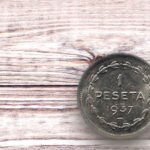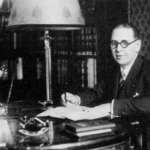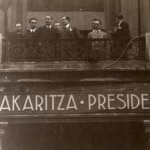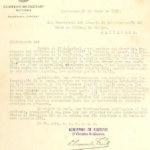A brief history of BBVA (XI): The Basque government's pressing matters during the war
On top of the issues that the banking industry as a whole was struggling with as a result of Spain being split in two and the constant shifting of its borders, Banco de Bilbao and Banco de Vizcaya were affected by another player due to their origin: the Basque government. The autonomy achieved during the later stages of the Republic by the Basque region would lead José Antonio Aguirre’s government to make more than a few economic decisions during the conflict.

The Basque government takes control
In 1936, Aguirre’s government issued a formal request for weapons to Republican representatives. As weeks passed and the order remained unfulfilled, Eliodoro de la Torre, Treasury Counselor, decided to take the matter into his own hands. He notified the Civil Governor of Vizcaya that he was going to impound the Bank of Spain’s gold reserves in Bilbao to buy weapons, and that he was determined to do so whether with his approval or by force, if he opposed.
De la Torre received approval and, after taking stock, five boxes filled with gold coins were transferred to the Biscayan port of Ondarroa. Each box went out to sea in a different fishing boat and already in French waters, all boxes were transferred to the same ship. The cargo landed in the Basque-French town of Bayonne and was deposited in a branch of Crédit Lyonnais. A month later, the Czechoslovak weapons and ammunition that De la Torre himself bought in Paris were at the disposal of Basque nationalist troops.
In the light of the operation’s success, on 16 October the Basque Treasury decreed the obligation to turn in all gold and silver coins as well as foreign currencies and securities. A few weeks later all assets and rights held by companies and citizens of the rest of Spain in the Basque Country to were

Eliodoro de la Torre, Treasury Counselor of the Basque government
On January 5, 1937, the Ministry of Finance forced an overhaul of the Boards of Directors of all banks, appointing employees and union and political representatives to take over key positions. Days later all agreements made by the former directors were declared void.
The Bilbao government issued a new currency with the inscription of 'Government of Euzkadi' on the obverse. The pieces were made of nickel worth 1 and 2 pesetas. It also went on to replace the cash checks that had started circulating on September 1 with others of the same value but of a higher quality. The value of the checks was 5, 10, 25, 50, 100, 500 and 1,000 pesetas.
Within one month, between January and February of 1937, two ships with English ensigns departed Biscay towards a Welsh port near Cardiff carrying two gold shipments. Their ultimate destination was London. The first one was the Fullerton Rose and carried eight boxes with gold worth 2,429,339 pesetas. By appointment the new Board of Directors of Banco de Bilbao Luciano, Luciano Ocerín travelled on the ship as part of the expedition. The second ship was the Marclyn arrived one month later, carrying gold valued at 1,331,920 pesetas.
In April, the government sold foreign currencies worth over 81 million pesetas and sold two batches of gold coins valued at 6.8 million for just over 2 million.
Emergency Measures
After the bombing of Guernica, the Basque government began to fear that Bilbao might targeted in a similar attack. On May 3, 1937, Jose Antonio Aguirre’s government informed the Banking and Bankers’ Association of Northern Spain about the steps they would be required to take. From the Ministry of Finance banks were urged to immediately remove and deposit in a safe location all escrow and security deposits, along with the corresponding documentation, as well as all cash deposits and books, records and effects, among others. They also added that, if needed, all these funds and items would be transferred to a foreign location, where they would remain "for as long as dictated by circumstances." After some discussions, the association agreed to convey the mandate to the financial institutions, which took it upon themselves and designated a specific taskforce to start enforcing the orders immediately.
A month before Bilbao fell in the hands of the rebels, the government ordered banks to start preparing for the evacuation of all assets except for those "required to keep the currently restricted running of banking operations from coming to a halt." Franco had deployed part of his fleet in the Cantabrian sea to prevent foreign ships, mainly British, from arriving at the port of Bilbao. The blockade’s effectiveness was uneven, and more than a few ships managed to reach their destination bringing food for the starving Biscayan population.

Members of the Basque Government on the balcony of the Carlton hotel in Bilbao, used as the seat of the government during the war
On 21 May, British ship Joyce Llewelyn departed from the El Abra port carrying 7,293 packing-cases containing title deeds and other documentation and archives turned in by the banks of Bilbao. Four representatives chosen by the Basque government, including Cirilo Ugarte, member of Bank of Bilbao’s Board of Directors and René Brouard, a Banco de Vizcaya employee, travelled in the ship. Two more ships, the Thurston and Thorpehall, would depart in the following days.
In San Sebastian, a city controlled by the national side since September 1936, the news of the Joyce Llewelyn operation arrived on the very next day of its departure, and the public and private banking systems started working to prevent the assets from being deposited in any foreign institutions. From the capital of Gipuzkoa letters were sent to the local British and French diplomats requesting their countries to prevent the operation plotted by the Aguirre government. The reply they received made clear the fact that they would try to cooperate but showing that the matter would ultimately depend on compliance with the laws of their respective countries.
The first two British ships were held in the French port of La Pallice, where even Joyce Llewelyn tried to mislead port authorities by changing its name to Seabank before anchoring. Thorpehall was allowed to move to the Dutch port of Flessinga.
Once Bilbao fell in the hands of the national side, demands over the assets stowed in the cargo holds of mentioned ships increased and the pressure exerted from the rebellious side increased. These were months of endless disputes and litigation after which French and Dutch courts ultimately frustrated the intentions of the Basque executive.
A few days before the fall of Bilbao, the government of Euzkadi made the preparations to leave for the town of Trucíos in the west of Biscay, from where they would eventually move to Santander. From there, they would still try to influence the decisions of the Boards of Directors of the Basque banks in order to, among other things, try to extract their assets from France.

Letter from the Treasury Counselor of the Basque Government to the Chairman of the Board of Directors of the Bank of Bilbao ten days after the fall of Bilbao in the hands of the sublevados